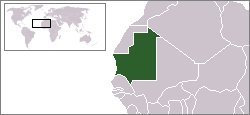Mauritania
Mauritania is the least developed and poorest country in northwest Africa. Geographically part of the Maghreb, Mauritania borders Algeria, Senegal and Mali, along with the disputed territory of Western Sahara.
The Mauritanian Adrar is probably exactly how you've always imagined the Sahara: endless ergs (dunes) and regs (rocky desert) with tabular small mountains, but most tourists stay along the west coast of Mauritania. There are a few beautiful sights far into the interior (rock formations in Aioun, for example). If you decide to travel off the beaten path, leave plenty of time to get around, though.
| WARNING: Some governments advise against all non-essential travel to Mauritania and all travel to many parts of Mauritania due to the danger posed by extremist jihadist groups. The remote desert regions along the border with Algeria and especially near the border with Mali are particularly dangerous. The ability of officials to provide consular assistance is extremely limited. (Dec 2016). | |
Government travel advisories
| |
| (Information last updated Jun 2018) |
Regions
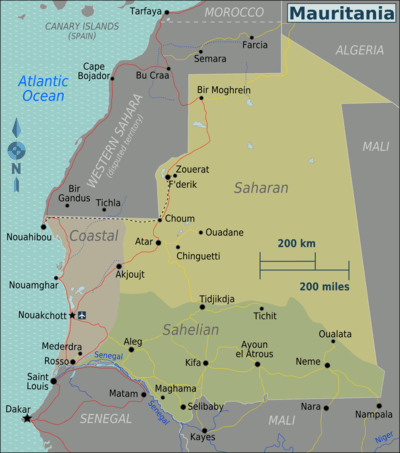
| Coastal Mauritania the narrow coastal strip with a crashing Atlantic coastline and the capital city |
| Sahelian Mauritania semi arid region in the south including the patchily lush Senegal River valley |
| Saharan Mauritania huge northern desert area which is largely very empty |
Cities
- 🌍 Nouakchott , the capital of Mauritania.
- 🌍 Atar
- 🌍 Chinguetti
- 🌍 Nouadhibou , large fishing centre and industrial harbour.
- 🌍 Tichit
Other destinations
- 🌍 Banc d'Arguin National Park — a breeding site for many different species of migratory birds, this coastal national park is a world heritage site.
Understand
Mauritania is a land about desert and ocean. It is of course no wonder that the main attractions for most tourists are the desert in Adrar and Tagant areas (around Atar), and the ocean in Banc d'Arguin (a natural reserve with dunes ending in the sea, full of millions of birds and protected by UNESCO).
Mauritania is an Islamic Republic. Don't be irrationally afraid of this political status - most Mauritanians are not extremists, even if the majority of the people in the North are very conservative and quite reserved. However, for people from outside the Maghreb there is a risk of kidnapping, especially in the more remote northern and eastern parts.
The southern part of the country is filled with friendly people, and they are very welcoming, if a little unused to tourists.
Travelling to Mauritania is becoming easier, with charter flights from France to Atar through the winter. Guides and tourist agencies are quite easy to find.
Climate
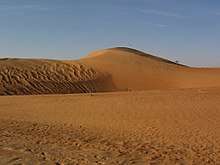
The climate is characterized by extremes in temperature and by meagre and irregular rainfall. Annual temperature variations are small, although diurnal variations can be extreme. The harmattan, a hot, dry and often dust-laden wind, blows from the Sahara throughout the long dry season and is the prevailing wind, except along the narrow coastal strip, which is influenced by oceanic trade winds. Most rain falls during the short rainy season (hivernage), Jul-Sep, and average annual precipitation varies from 500 to 600 millimetres in the far south to less than 100mm in the northern two-thirds of the country.
People
Haratin, sometimes referred to as Black Moors, are the largest single ethnic group in Mauritania, constituting 40% of the population, and are descendants of former slaves. About 30% of the population are Bidhan, also called Moors. The rest of the population mostly consists of members of peoples who also live in neighboring Sahelian countries such as Senegal and Mali, including the Fula, Soninke, Bambara and Wolof.
Get in
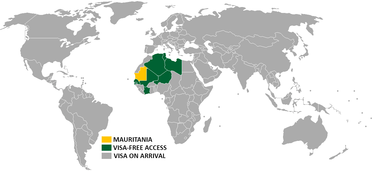
Entry requirements
Citizens of all Western nations need a visa to enter. Holders of West African passports do not require a visa.
30-day visas are available on arrival at the border with Western Sahara and the international airports in Nouakchott and Nouadhibou. They cost €55 or US$60 (as of Dec 2018). No additional documentation is required.
Overland travellers can also arrange them in Rabat, where a single entry visa fee is 1,000 dirham. A double entry visa is also available for 1,100 dirham. Two passport-size photos are required, as well as a copy of the information pages of your passport. Visas are available on the same day in the afternoon if applied for in the morning for people of most nationalities.
For most people there are no vaccinations required in Mauritania. Only ones coming from yellow fever endemic zones are required to present a vaccination certificate.
By plane
Nouakchott–Oumtounsy International Airport (NKC IATA) is the base for Mauritanian Airlines, which flies to Bamako, Dakar, Abidjan and Nouadhibou. It also receives flights from Algiers on Air Algérie and from Paris on Air France. Tunisair has flights to Tunis, Senegul airlines has flights to Dakar, Turkish airlines has flights to Istanbul, Royal Air Maroc has flights to Casablanca, CanaryFly have flights to Gran Canaria.
Nouadhibou International Airport (NDB IATA) receives flights from Gran Canaria with Mauritanian Airlines.
By train
No trains run between Mauritania and its neighbours.
By car
Mauritania has open road borders with Western Sahara, Mali and Senegal. These borders are open to crossing by private motor vehicle or bicycle but the first two are extremely dangerous.
The road from the Western Sahara/Morocco enters the country near Nouadhibou. The road is paved all the way to the Moroccan border post in Fort Guerguarat, where one has to traverse about 7 km of twisting, stony, but straightforward pistes to reach the Mauritanian border, where the tarred road begins again. Although the driving is simple, care should be taken not to leave the well-worn pistes between the two border posts, because the area is a mine field. This danger is still present once you reach the tar on the Mauritanian side, and the area is not considered mine-free until you pass the railway line.
The crossing formalities are straightforward. Transit visas - valid for 3 days - can no longer be bought at the border, although this may change again. There is a bureau de change at the border, and a vehicle insurance office and numerous hopeful guides for making the old desert crossing down to the capital.
There are numerous pistes running across the Mauritanian border from Mali. These used to be the de facto route between the two countries, however there now exists a new tar road connecting Nara in Mali to Ayoun al Atrous in Mauritania. The border formalities in Mali are completed at various buildings around Nara town (local children will lead you to the police or customs for a small present). The Mauritanian formalities are conducted at a string of road-blocks along the border road.
An alternative land route which goes direct from Mauritania to Timbuktu, Mali is to travel the road Southeast from Néma, which is at the end of a good tarred road from Nouakchott. This dirt road continues to Bassekounou before crossing the border near Léré, Mali, where it improves to a good dirt road to Niafunké and on to Timbuktu.
By bus/bush taxi
- From Morocco: Supratours runs a bus to the border at Guerguerat. It departs from the Dakhla waterfront at 08:00 and arrives at the frontier at 13:00 for 160 dirham, 15:00 from the frontier to Dakhla at 20:30. Access is available by hitching with overlanders from Dakhla (most can be picked up from Camping Moussafir just north of Dakhla) or from the Mauritanian embassy in Rabat, or by paying for passage with Mauritanian traders. These can be found opposite the first police checkpoint north of Dakhla, the going rate is 250-380 dirham (negotiable) the ride should be started rather early and takes most of the day and border crossing is closed overnight. Cars with experienced drivers can be organized from Hotel Sahara (the budget one). This costs around 250 dirham per person.
- To Morocco: Cars with drivers can be arranged to cross the minefield from Mauritania to Western Sahara from Hotels in Nouadhibou.
- From Senegal: Bush taxis can be taken from Dakar (6,000 CFA francs) and St Louis (2,000 CFA francs) (amongst others) to Rosso, where a ferry makes the trip across the Senegal river, and further bush taxis can be taken to Nouakchott (about 200 ouguiya). Be careful of bush taxis offering deals that seem too good to be true. They may be illegal taxis and could prove to be a dangerous means of transport. There will most likely be a number of drivers waiting. Ask around and find out the going rate. Other crossing points from Senegal include the Diama dam just north of St Louis, public transport also operates on this route.
- From Mali: Pickup trucks leave Kayes for Selibaby daily. It is also possible to enter at Nema, and across the southern border at several points.
Get around
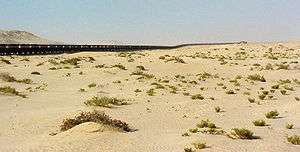
Make sure to have plenty of passport copies for travelling between towns. It’s not uncommon to give away up to 5-10 passport copies a day to police at checkpoints.
By train
There is only one train line in Mauritania, linking Nouadhibou, Choum and Zouerat, but it's a tourist attraction itself. It's used to carry iron ore from the Zouerat mine to Nouadhibou harbour.
The train departs daily from Nouadhibou at around 15:00 and arrives in Choum (for Atar) at around 02:00 the next morning. Check departure times on arrival.
In Mauritania there is only one passenger car, but travel in iron ore hopper is also possible (and advisable, as the passenger car is usually overcrowded and tickets are required). There is also first-class accommodation - first-class seats are limited, but they allow access to a smaller room with bunk beds. It does not necessarily ensure more comfort, though. Ticket price is 300 ouguiya (2018) for second class in the passenger car and travel in the hopper is free of charge. Remember to have a scarf to cover your face, as there is a lot of dust.
From Choum it's possible to get to Atar with a bush taxi. The journey could take up to eight hours if the vehicle has a breakdown.
Talk
Arabic is the official language. Hassaniya Arabic is the language of the Moor majority, while other languages are spoken by black Africans in the south including Pulaar, Wolof, and Soninke (especially in the Guidimakha region around Selibaby). French is still spoken by many. This is especially true near towns. In the countryside, individuals may often speak several languages but not French.
It is considered polite to say Salaam aleikum when entering a taxi, office or when greeting someone. It is the first greeting for most of the dialects spoken in the region.
See
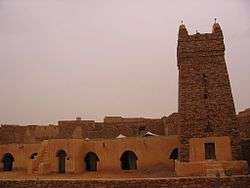
The Adrar massif in the north is full of stunning desert scenery. Take a 4x4 off-piste across rocky terrain and through narrow canyons to explore the lush, hidden oases which have provided water and refuge to traders crossing the Sahara for centuries. The Adrar contains two of the country's magnificent historical cities. Chinguetti was once a trading centre and centre of Islamic scholarship whose architecture remains unchanged in nearly a millennium. Along with Ouadane and a few other small towns, it is a UNESCO World Heritage Site. And don't forget to miss the world's longest train either just for a glimpse or to hop into an iron ore car filled with Mauritanians for the 12-hour journey from the Adrar to the coast. The remains of the Almoravid capital Azoughui, and rock paintings, are draws of the Adrar.
Much of the central coastline is part of Parc National du Banc d'Arguin—home to millions of migrating birds each year. At Nouamgar, you can watch the unique spectacle of local tribesmen communicating with dolphins to round up teams of fish into shallow waters for them to be netted.
In the southeast, the oasis city of Oualata was the southern end of most trans-Sahara trading routes in the 13th & 14th centuries. The city has colourful buildings, many of which feature intricate geometric designs. The city is a UNESCO World Heritage Site and also boasts a manuscript museum with examples of ancient scrolls in fine calligraphy.
Do
- Visiting the Hamoni library in Chinguetti
Buy
|
Exchange rates for Mauritanian ouguiya As of January 2019:
Exchange rates fluctuate. Current rates for these and other currencies are available from XE.com |
Money
The country's currency is the Mauritanian ouguiya, denoted by the symbol "UM" or "أوقية" (ISO code: MRU). It was revalued in Dec 2017: 10 old UM (ISO: MRO) = 1 new UM (MRU).
Mauritania is poorly connected to the international banking system. Many ATMs in Nouakchott now accept international Visa cards at banks such as BNP, Attijari and Societe Generale (the latter also accepts Mastercards) in Nouakchott and Nouadhibou, but otherwise, credit cards are accepted almost nowhere. It is easy to change euros, dollars and CFA francs in Nouakchott. There are few Mastercard and Visa card ATMs in Nouadhibou.
Shopping
Souvenirs can be bought at Marché Capital or Marché Sixième in Nouakchott, or at tourist shops in the Adrar. Fabric will be sold in boutiques all over the country, but Kaedi is famous for its tie-dying.
In general, the quality of most Mauritanian souvenirs is not as good as one might expect. That said, you can find leather products, pipes, wooden bowls, tea pots and silver jewellery among other things (be careful with the quality of jewellery). Fabric, however, is tie-dyed by hand and can be quite beautiful. Fabric will be sold as a mulafa (veil)--usually gauzy and one piece--or as material for a boubou, with two separate pieces for a skirt and top. Fabric is sold anywhere for anything from UM 150-800, depending on the fabric quality and work involved.
When buying anything in Mauritania, be sure to bargain. Sometimes the starting price will be three times the actual price. Stay friendly, but don't worry about insulting anyone by asking for a lower price.
Eat
There is a decent variety of restaurants in Nouakchott with dishes costing from UM100 to 250. Most restaurants in the capital offer much the same menu - simple pizzas, hamburgers, sandwiches and salads. There is a string of restaurants on the road from the Stade Olympique to the French Embassy. Good ones include Pizza Lina, Café Liban and Le Petit Café. The Sahara Café, on the other side of the stadium, is also a good place for pizza, sandwiches or Lebanese dishes, and has some of the best reasonably-priced food in town. Near Marche Capitale, there is a street of sandwich shops that offer near-identical menus, the best of which is the Prince (which taxi drivers know by name).
Outside of Nouakchott, it is possible to find a hamburger in Atar. Otherwise, the choice is local dishes: fish and rice (chebujin) in the south and rice and meat or couscous in the north. Hole-in-the-wall restaurants can be found everywhere and serve meals from UM 20-50. Mechui, or grilled sheep, is also delicious if a little more expensive. Look for carcasses hanging by the side of the road. Some fruit can be found in most regional capitals. Note that most restaurants outside of Nouakchott do not have very high standards of cleanliness. Since most small restaurants go under within a few years of opening, your best bet in trying to find one in a regional capital is to just ask locals for directions to whatever is nearby. Another alternative, in the absence of a restaurant, is paying a family to prepare food for you, which should be relatively inexpensive (no more than UM 150), even if it takes a while (up to a couple hours to buy the food and prepare it).
Bottled water can be bought for UM 20 and is a good idea for anyone not accustomed to Africa.
If none of this sounds good, keep in mind that boutiques everywhere sell bread, cakes, biscuits and drinks if nothing else.
Tea is usually served after a meal, but it is not included with the meal at restaurants. If you are offered tea in someone's home, it is impolite to leave until at least the second (of three) glasses. The whole process takes about an hour.
Drink
Despite being an Islamic country there are a few fun bars in the capital. Drinking can be expensive, with a beer costing up to US$6. There is a nightclub inside the French Embassy compound. For the non-French, try the Salamander or the trashy (but open late) Club VIP. Next door to VIP is the Casablanca, a more low-key bar with live music on the weekends. It is illegal to import alcohol beyond 0.5 litres, which must be declared.
Sleep
All ranges of accommodation are available, with the highest class hotels available only in Nouakchott and Atar. "Auberges" and Campsites can rent beds/mattresses for as little as UM 150 in the Adrar and Nouadhibou.
There is usually at least one hotel in the regional capitals in the rest of the country, although they can be expensive for what you are getting. If possible, make friends with a local and try to get invited to stay with their family. As long as you don't mind sleeping on the ground on a foam mat, sleeping/eating near animals or using a latrine, you will probably end up having a pleasant and memorable stay.
Learn
- The University of Nouakchott has very few short term courses of interest to most travellers.
Stay safe
The area near the Western Sahara is heavily mined and travel through this area is highly inadvisable. Border areas lining Algeria and Mali are notorious for banditry. The single paved road coming from Morocco is especially dangerous, havibg been the site of Al Qaida kidnappings. If you must travel on this path, it is best to do so in a tight caravan. In other areas, one should avoid flaunting wealth or expensive wares. Daunting though it may seem, a bit of research and common sense will ensure a pleasant trip in Mauritania.
Check your embassy or consulate travel advisories carefully. Due to increasing numbers of attacks on Westerners in the past several years, most Western nations advise great caution. Resident expatriates travel between cities by day, in groups and on major routes.
Stay healthy
For the majority of Westerners, the local water in any part of the country (including Nouakchott) is not safe to drink. Visitors should drink only bottled water if they don't have access to some type of water purifying or filtration system. The Sahara is a very dry climate. You may become dehydrated quite easily, and not be aware of it. The best rule of thumb is to be sure that you have urinated three times each day, at reasonable intervals. In the hottest part of the year, this might mean drinking several litres of water each day.
Malaria is endemic in the southern part of the country, and visitors should always use a mosquito net there. Mosquitoes are less common in the dry desert in the north of the country, but exist year-round in the south, if a bit less prevalent during the dry season (December-May).
Respect
|
Ramadan Ramadan is the 9th and holiest month in the Islamic calendar and lasts 29–30 days. Muslims fast every day for its duration and most restaurants will be closed until the fast breaks at dusk. Nothing (including water and cigarettes) is supposed to pass through the lips from dawn to sunset. Non-Muslims are exempt from this, but should still refrain from eating or drinking in public as this is considered very impolite. Working hours are decreased as well in the corporate world. Exact dates of Ramadan depend on local astronomical observations and may vary somewhat from country to country. Ramadan concludes with the festival of Eid al-Fitr, which may last several days, usually three in most countries.
If you're planning to travel to Mauritania during Ramadan, consider reading Travelling during Ramadan. |
Learn Salaam alaykum and use it when greeting people. If you are a man, don't try to shake hands with a woman, and vice versa (note that some African women will not have a problem with shaking a man's hand, but it is best to not try to initiate contact, just follow their lead). You can, however, say hello and touch your hand over your heart.
Be careful to eat with your right hand, especially outside of Nouakchott where you may not be offered silverware. Like other places in the Arab world, the left hand is reserved for the bathroom. If you're left-handed... try hard.
Covering your head isn't required, but it is polite. It may cut down on the Madame, ou bien Mademoiselle? (Mrs. or Miss?) question, but Westerners, especially women, will be the target of unwanted attention and minor harassment everywhere in the country. Be aware though, that many Mauritanians, both male and female, think that a direct gaze is a sexual invitation. There is even a phrase in Hassiniya, ayna m'tina, meaning strong eyes, to describe what many people feel is an aggressive act. This doesn't mean however, that the men have carte blanche to be jerks, though. Calling them on their bad behaviour, or pointing it out to the ever present bystanders, can often work. If you give respect, you can demand it also. The Moors respect women who stand up for themselves, even while they push you to see how far they can get.
If you are travelling with someone of the opposite sex, avoid touching in public. It's actually much more common to see two men holding hands than a woman and a man. As far as dress, the more skin you show, the more negative attention you will receive. In Nouakchott, women can wear trousers, but avoid tank tops and to-the-knee skirts. Long skirts are the best choice for women. It is a good idea to cover your arms also. Trousers display the crotch area and thus are also disturbing, especially to people in the countryside who aren't as used to seeing this as the city folk. Most people will be very polite, and you will not know what they are thinking.
If you are a female, there is no non-sexual reason, ever, to go off in private with a man. If they ask you to step into an office, or back of a shop or anywhere; don't. The men are aware that that is an unreasonable request, and no one would ask you for a private chat if they meant well. If you allow yourself to be alone with a man, for however brief a time, everyone will assume you had sex, and will judge you accordingly. As a weakling, not as dissolute.
If you are a LGBT visitor, do not try to be open about your sexuality to any Mauritanian. They will act very harshly to this. Also do not make any acts in public that would imply the fact that you are LGBT: Mauritania imposes the death sentence for homosexuality.
If you are white, Nasrani, Toubac and Toubab refers to you. Little kids, and sometimes rude adults, will refer to you by this name. Nasrani actually means a person from Nazareth. Since Christians follow Christ's teachings, and Christ is from Nazareth, then Christians are all honorary Nazarenes.
Beware of people who may try to take advantage of your politeness in order to try to make a sale. Be aware that in market areas, almost everyone who tries to befriend you is trying to sell you something at an inflated price. They will try many tricks to get you to buy items from them (including "giving them to you as a gift"), and a few might even accuse you of not liking Africans if you decline to look at their souvenir shop. If someone is going beyond the normal limits to bother you, it is not impolite to tell them, without question, that you are not interested. If they ask for something that you own, just say that you need it right now, and can give it to them in a month or so.
Connect
There are three operators of GSM networks: Mattel (excellent English website), Mauritel Mobiles and Chinguitel. Prepaid plans are available for three of them. Further Information regarding Coverage and Roaming are available from GSM-World.
For tours into the desert where no GSM-Network is available satellite phones are a good solution. Service providers include Thuraya, Iridium and Inmarsat. Thuraya tends to be the cheapest and the easiest to use. The equipment is also available for rent.
Internet cafés with DSL internet can be found in Nouakchott and Nouadhibou for MRO200-300/h. Slower connections plague "cybercafés" elsewhere in the country, but it's possible to check emails.
